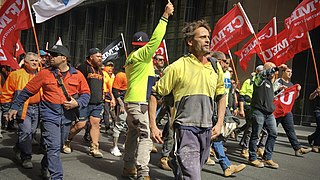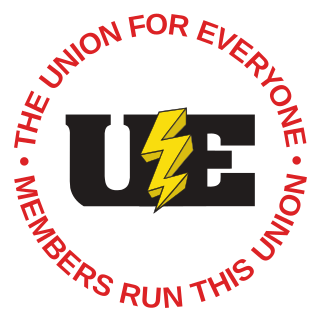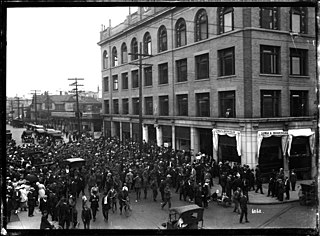Related Research Articles
A trade union or labor union, often simply referred to as a union, is an organization of workers whose purpose is to maintain or improve the conditions of their employment, such as attaining better wages and benefits, improving working conditions, improving safety standards, establishing complaint procedures, developing rules governing status of employees and protecting and increasing the bargaining power of workers.
Labour laws, labour code or employment laws are those that mediate the relationship between workers, employing entities, trade unions, and the government. Collective labour law relates to the tripartite relationship between employee, employer, and union.

Strike action, also called labor strike, labour strike in British English, or simply strike, is a work stoppage caused by the mass refusal of employees to work. A strike usually takes place in response to employee grievances. Strikes became common during the Industrial Revolution, when mass labor became important in factories and mines. As striking became a more common practice, governments were often pushed to act. When government intervention occurred, it was rarely neutral or amicable. Early strikes were often deemed unlawful conspiracies or anti-competitive cartel action and many were subject to massive legal repression by state police, federal military power, and federal courts. Many Western nations legalized striking under certain conditions in the late 19th and early 20th centuries.

A sit-down strike is a labour strike and a form of civil disobedience in which an organized group of workers, usually employed at factories or other centralized locations, take unauthorized or illegal possession of the workplace by "sitting down" at their stations. By taking control of their workplaces, workers engaged in a sit-down demonstrate their power, build solidarity among themselves, prevent the deployment of strikebreakers or removal of industrial equipment, and cause cascading effects on the chain of production within and between factories. However, sit-down strikes are illegal in the vast majority of countries, complicating their use.

The Canada Labour Code is an Act of the Parliament of Canada to consolidate certain statutes respecting labour. The objective of the Code is to facilitate production by controlling strikes & lockouts, occupational safety and health, and some employment standards.

The United Electrical, Radio and Machine Workers of America (UE), is an independent democratic rank-and-file labor union representing workers in both the private and public sectors across the United States.
Overtime bans are a type of strike in which workers refuse to engage in overtime work, being any work that falls outside of contracted hours. They do this to leverage their employer into negotiating various working conditions. Often organised in unions, workers may choose this form of industrial action to bargain for a higher rate of pay, better working conditions or to discourage an employer from making redundancies. Unlike a full strike in which employees are usually in breach of their contract, workers engaging in overtime bans are typically well protected. Employers cannot legally withhold normal wages during an overtime ban if employees are not breaching the terms of their employment contracts by refusing to do overtime work. However, the legalities of overtime bans do vary between countries. Overtime bans are effective where "industries and organisations run on such habitually high levels of overtime or goodwill that overtime bans ... can have a significant and immediate impact upon the availability of a good or service". Historically, unions have at times received criticism on ethical grounds for choosing to enact overtime bans. The literature records the occurrence of such bans from the 1800s and there is documentation of their use in four continents.

The Delano grape strike was a labor strike organized by the Agricultural Workers Organizing Committee (AWOC), a predominantly Filipino and AFL-CIO-sponsored labor organization, against table grape growers in Delano, California to fight against the exploitation of farm workers. The strike began on September 8, 1965, and one week later, the predominantly Mexican National Farmworkers Association (NFWA) joined the cause. In August 1966, the AWOC and the NFWA merged to create the United Farm Workers (UFW) Organizing Committee.

The Trade Union and Labour Relations (Consolidation) Act 1992 is a UK Act of Parliament which regulates United Kingdom labour law. The act applies in full in England and Wales and in Scotland, and partially in Northern Ireland.
The Bituminous coal strike of 1974 was a 28-day national coal strike in the United States led by the United Mine Workers of America. It is generally considered a successful strike by the union.

The U.S. postal strike of 1970 was an eight-day strike by federal postal workers in March 1970. The strike began in New York City and spread to some other cities in the following two weeks. This strike against the federal government, regarded as illegal, was the largest wildcat strike in U.S. history.

Labor relations or labor studies is a field of study that can have different meanings depending on the context in which it is used. In an international context, it is a subfield of labor history that studies the human relations with regard to work in its broadest sense and how this connects to questions of social inequality. It explicitly encompasses unregulated, historical, and non-Western forms of labor. Here, labor relations define "for or with whom one works and under what rules. These rules determine the type of work, type and amount of remuneration, working hours, degrees of physical and psychological strain, as well as the degree of freedom and autonomy associated with the work." More specifically in a North American and strictly modern context, labor relations is the study and practice of managing unionized employment situations. In academia, labor relations is frequently a sub-area within industrial relations, though scholars from many disciplines including economics, sociology, history, law, and political science also study labor unions and labor movements. In practice, labor relations is frequently a subarea within human resource management. Courses in labor relations typically cover labor history, labor law, union organizing, bargaining, contract administration, and important contemporary topics.
The International Harvester strike of 1979–1980 was a strike by the United Auto Workers (UAW) against the International Harvester (IH) company over work rules. The strike began on November 1, 1979, and ended after 172 days on April 20, 1980. As of May 2008, it was the fourth-longest strike of national importance ever held by the UAW.
A master contract or master agreement is a collective bargaining agreement which covers all unionized worksites in an industry, market or company, and which establishes the terms and conditions of employment common to all workers in the industry, market or company.
The Graduate Teaching Fellows Federation (GTFF) is a graduate student union at the University of Oregon (UO) established in 1976 to represent graduate student workers, and it is one of the oldest graduate student unions in the United States. Developed out of the earlier Graduate Student Employees Association, the UO administration objected to the establishment of the union, citing that graduate workers were "not public employees", but were rather "primarily students receiving a form of financial aid similar to stipends or scholarships." The Oregon Employment Relations Board (ERB) ruled in favor of the graduate students and supported their right to organize. The GTFF began organizing its first contract in April 1977 with the University of Oregon administration. The negotiations reached an impasse in 1978, and it was not until after two strike votes that an agreement was reached. In 1989, the GTFF secured subsidies for health insurance, which was expanded in 1993 to be fully employer-paid, one of the first such programs offered to graduate teachers in the United States.

During the strike wave of 1945–46, a strike of almost 3,500 tugboat workers in New York City occurred on Monday, February 1, 1946. The expectations of the strike were to bring the world's busiest harbor to a virtual standstill. Captain William Bradley, President of Local 333 of the International Longshoremen's Association's United Maritime Division, stated two days before the actual strike that a strike vote had been taken the previous weekend, during a breakdown of negotiations with the Employers Wage Adjustment Committee, which represents the port's owners and operators.
The 2021–2022 Columbia University strike was a labor strike involving graduate student workers at Columbia University in New York City. The strike began on March 15, 2021, and ended on May 13, 2021. However, additional strike action commenced on November 3 and lasted until January 7, 2022, when a tentative agreement with the university was reached. The strike was organized by the Graduate Workers of Columbia–United Auto Workers Local 2110 (SWC–UAW), a labor union representing student workers at the university. The goals of the strike were an increase in wages, increased healthcare and childcare coverage, and third-party arbitration in cases of discrimination and sexual harassment.
The 2021 New Brunswick public sector strike was labour strike in the Canadian province of New Brunswick involving employees of the provincial government, represented by the Canadian Union of Public Employees (CUPE). In October 2021, the workers voted to take strike action.
Workers for the Scripto company in Atlanta, Georgia, United States, held a labor strike from November 27, 1964, to January 9, 1965. It ended when the company and union agreed to a three-year contract that included wage increases and improved employee benefits. The strike was an important event in the history of the civil rights movement, as both civil rights leaders and organized labor activists worked together to support the strike.
References
- ↑ Cooper, James (25 May 1998). "Denmark: One Strike Against The Economy". Bloomberg. Retrieved 1 May 2024.
- 1 2 3 4 Slusher, Margaret (21 March 2013). "Danish workers conduct general strike for gains in wages, jobs, and vacation days, 1998". Global Nonviolent Action Database. Retrieved 1 May 2024.
- 1 2 Lowry, Sam (27 January 2008). "1998: Danish private sector strike". LibCom. Retrieved 1 May 2024.
- ↑ "World News Briefs; Danish Premier Moves To End Labor Strike". The New York Times. 7 May 1998. Retrieved 1 May 2024.
- ↑ Madsen, Jørgen Steen (27 December 1998). "1998 Annual Review for Denmark". Eurofound. Retrieved 1 May 2024.
- ↑ "Strike hits Denmark's industry and transport". BBC. 27 April 1998. Retrieved 1 May 2024.